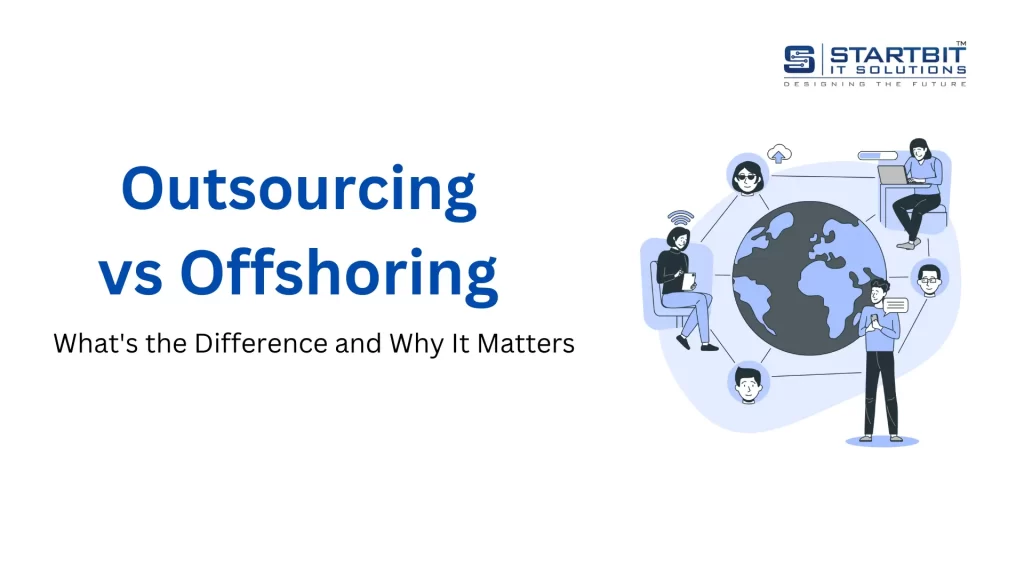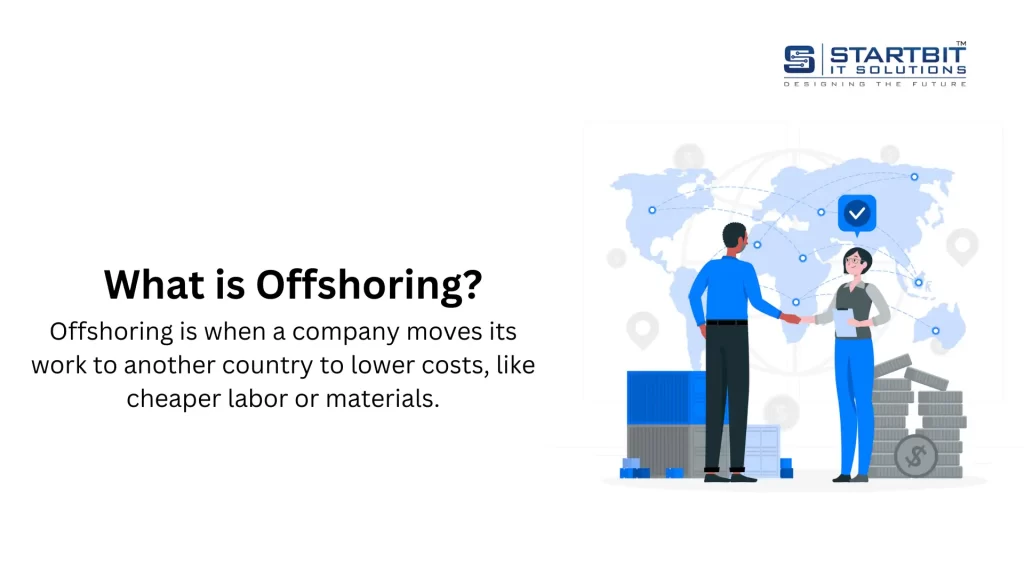
In today’s global economy, businesses are always looking for ways to improve their operations, cut costs, and work more efficiently. Two common strategies to achieve these goals are outsourcing and offshoring. Even though people sometimes use these terms interchangeably, they mean different things and have different impacts on a company. Knowing the difference between outsourcing and offshoring is important for making smart decisions that fit your business goals.
What is Outsourcing?
Outsourcing refers to the practice of contracting out specific business tasks or functions to a third-party provider, often located in the same country or abroad. The goal is to leverage the expertise, infrastructure, or cost advantages offered by the external company. This allows businesses to focus on their core competencies while offloading non-core tasks such as IT support, customer service, or human resources.

Outsourcing can be classified into two main types:
- Onshore Outsourcing – This involves hiring a third-party provider located within the same country.
- Offshore Outsourcing – This refers to outsourcing tasks to a provider in a different country, often to benefit from lower labor costs.
Key Benefits of Outsourcing:
- Cost Savings: Outsourcing allows businesses to cut down on expenses by eliminating the need to hire and train employees for specific tasks. Additionally, third-party providers often operate in economies with lower labor costs.
- Focus on Core Business: By delegating non-core functions, companies can focus more resources and attention on activities that directly impact revenue growth.
- Access to Expertise: Outsourcing provides access to specialized skills and advanced technologies that may not be available in-house.
- Scalability: Outsourcing can be adjusted according to the business’s needs, enabling easier scaling of operations as required.
Specialized Outsourcing Services:
Specialized outsourcing services refer to the delegation of highly specific or niche business functions to external experts or organizations that have deep knowledge or expertise in a particular area. These services go beyond general outsourcing by focusing on tasks that require specialized skills, tools, or technology.
Examples of specialized outsourcing services include:
- IT and Software Development – Custom software development, cybersecurity, or cloud management services provided by expert IT firms.
- Legal Process Outsourcing (LPO) – Contracting legal services such as legal research, document review, or compliance management to specialized law firms or professionals.
- Accounting and Financial Services – Outsourcing tasks like tax preparation, auditing, payroll, or financial analysis to specialized accounting firms.
- Medical and Healthcare Outsourcing – Services such as medical billing, transcription, or pharmaceutical research are often outsourced to firms specializing in healthcare.
- Engineering Services Outsourcing (ESO) – Specialized tasks like design, product development, or CAD (Computer-Aided Design) services are outsourced to engineering experts.
- HR and Recruitment Process Outsourcing (RPO) – Outsourcing the recruitment, talent acquisition, or HR management processes to firms with deep expertise in human resources.
Challenges of Outsourcing:
- Quality Control: Since the work is done by external teams, businesses may face challenges in maintaining consistent quality.
- Communication Barriers: Depending on the location of the outsourcing provider, there may be language or cultural differences that can impact collaboration.
- Security Risks: Outsourcing certain functions, especially those involving sensitive information, may expose a business to data security and confidentiality risks.
What is Offshoring?
Offshoring is the relocation of a company’s business processes or production to another country, typically to leverage lower costs. Unlike outsourcing, where the task is handed over to a third-party, offshoring often involves setting up a branch or subsidiary in another country to handle the business operations directly.

Offshoring is commonly used in industries such as manufacturing, IT development, and customer service, where labor costs in the home country may be prohibitively high. Popular offshoring destinations include countries like India, China, and the Philippines, where skilled labor is available at a fraction of the cost found in Western countries.
Key Benefits of Offshoring:
- Cost Efficiency: One of the most significant advantages of offshoring is the potential for substantial cost savings due to lower wages, operational costs, and taxes in the offshore location.
- Control Over Operations: Since the offshore team is usually a part of the company, businesses maintain greater control over operations, work culture, and quality standards compared to outsourcing.
- Access to a Global Talent Pool: Offshoring provides access to a broader pool of skilled labor that may not be readily available in the company’s home country.
- Extended Working Hours: By having teams in different time zones, companies can keep their operations running 24/7, ensuring faster turnaround times and continuous workflow.
Challenges of Offshoring:
- Cultural and Communication Barriers: Differences in work culture, language, and time zones can lead to misunderstandings and communication issues.
- Initial Setup Costs: While offshoring may lead to cost savings in the long run, the initial setup of an offshore office or facility can be expensive and time-consuming.
- Legal and Regulatory Hurdles: Operating in a foreign country means navigating unfamiliar laws and regulations, which can present compliance challenges.
- Employee Turnover: In many popular offshoring destinations, high competition for skilled labor can lead to higher employee turnover, which can impact the consistency of operations.
Key Differences Between Outsourcing and Offshoring:
While outsourcing and offshoring are both strategies aimed at optimizing business operations and reducing costs, they have some fundamental differences:
Ownership and Control: In outsourcing, businesses hand over control of certain tasks or functions to a third-party provider. In offshoring, the business retains full ownership and control of the operations, as the offshore team is typically part of the company.
Location: Outsourcing can occur domestically or internationally while offshoring always involves relocating operations to a different country.
Cost Structure: Both strategies offer cost-saving opportunities, but outsourcing often provides immediate financial relief due to lower labor costs and infrastructure expenses. Offshoring, while also cost-efficient, typically requires a higher upfront investment for setting up overseas operations.
Specialization: Outsourcing is often used for highly specialized, non-core tasks such as payroll management or IT services. Offshoring, on the other hand, is more commonly employed for core functions such as manufacturing or software development.
Risk Management: Outsourcing carries the risk of losing some control over quality and processes, while offshoring involves more direct oversight but also exposes businesses to geopolitical and economic risks in the foreign country.
When to Choose Outsourcing Over Offshoring:
Choosing between outsourcing and offshoring depends on a company’s specific goals and operational needs. Outsourcing is an ideal choice when:
- The task or function is non-core and can be efficiently handled by a specialized provider.
- The company requires flexibility and scalability without committing to long-term infrastructure investments.
- The priority is immediate cost savings and access to specialized expertise without managing an additional workforce.
When to Choose Offshoring Over Outsourcing:
Offshoring is more suitable when
- The business process is core to the company, and maintaining control over the operations is crucial.
- The goal is long-term cost savings, and the company is willing to invest in setting up overseas infrastructure.
Reasons Why Companies Outsource:
Companies outsource for a variety of reasons, primarily to improve efficiency, reduce costs, and focus on core business activities. Here are some common reasons why companies choose to outsource:
- Cost Savings: Outsourcing can significantly reduce labor costs, especially when using service providers in countries with lower wages. This allows companies to maintain quality while cutting operational expenses.
- Focus on Core Competencies: By outsourcing non-core functions (e.g., IT, customer support, or payroll), companies can focus more on their key strengths and strategic business areas.
- Access to Expertise: Outsourcing allows companies to leverage specialized skills and expertise from external providers, especially in fields where in-house expertise is limited.
- Increased Efficiency: Outsourcing firms often have optimized processes and advanced technology that can improve the efficiency and speed of certain tasks.
- Scalability and Flexibility: Outsourcing provides flexibility in scaling operations up or down based on demand. It’s easier to adjust outsourced functions without the challenges of hiring or laying off employees.
- Risk Management: Certain risks, such as compliance with regulations or the management of complex technical issues, can be transferred to specialized service providers, reducing the company’s exposure to risk.
- Time Zone Advantage: Companies can benefit from round-the-clock operations by outsourcing tasks to regions in different time zones, improving overall productivity and responsiveness.
- Access to Global Talent Pool: Outsourcing allows companies to tap into a global talent pool, gaining access to skills and resources that may not be available locally.
- Faster Time to Market: For industries with fast-paced innovation cycles, outsourcing certain processes can speed up development and delivery, helping companies stay competitive.
- Capital Expenditure Reduction: By outsourcing certain operations (like IT infrastructure), companies can convert fixed costs into variable ones, avoiding large capital expenditures on equipment, facilities, or technology.
Reasons Why Companies Offshore:
Companies choose to offshore for several key reasons, often driven by strategic, financial, and operational factors. Here are some of the main reasons:
- Cost Reduction: The primary reason companies offshore is to reduce costs, particularly labor costs. Wages in countries like India, the Philippines, or Mexico are often significantly lower than in developed nations, allowing businesses to save on salaries, benefits, and overhead.
- Access to Skilled Labor: Offshoring provides access to a vast pool of skilled professionals, especially in fields like software development, customer support, and manufacturing. Many countries have highly educated workforces with expertise in specific industries.
- Focus on Core Business Functions: By offshoring non-core functions (such as IT support or customer service), companies can focus more on their primary business operations and strategic initiatives, improving overall efficiency.
- Scalability: Offshoring enables businesses to scale their operations quickly. With access to a larger workforce in offshore locations, companies can ramp up production or service capacity without significant infrastructure investment.
- 24/7 Operations: Offshoring to countries in different time zones allows companies to operate around the clock. This is especially beneficial in industries like customer service, where continuous availability is essential.
- Market Expansion: Offshoring can also help companies expand into new markets. By establishing a presence in another country, businesses can gain local knowledge, build brand awareness, and access new customer bases.
- Tax Incentives: Some countries offer favorable tax conditions or financial incentives to attract foreign companies, making it financially advantageous to offshore operations.
- Diversification of Risk: Offshoring provides companies with geographical diversification. By spreading operations across multiple countries, businesses can reduce the risks associated with political instability, natural disasters, or economic downturns in one region.
- Technological Advancements: Improvements in communication technologies, cloud computing, and project management tools have made it easier than ever to manage offshore teams efficiently, encouraging more companies to adopt offshoring.
- Increased Flexibility: Offshoring allows companies to be more flexible in how they allocate resources. They can adjust production or service levels based on demand without the long-term commitments associated with local staffing and infrastructure.
The Future of Outsourcing and Offshoring:
As businesses continue to evolve in the digital age, both outsourcing and offshoring are expected to play crucial roles in global operations. The rise of automation, artificial intelligence, and remote work is likely to blur the lines between these two strategies. Companies must stay agile and evaluate which approach best aligns with their long-term objectives, competitive pressures, and the changing global landscape.
Ultimately, the decision to outsource or offshore should be based on a thorough analysis of the specific business needs, available resources, and potential risks. By making informed choices, businesses can harness the full potential of these strategies to optimize performance and ensure sustainable growth.
Conclusion:

At Startbit IT Solutions, we understand the distinction between outsourcing and offshoring and how both can benefit your business. As an experienced offshore software and IT solutions provider since 2008, we specialize in delivering customized services that cater to your unique business needs. Whether you’re looking for expert consultation or end-to-end IT services, our dedicated team is here to help streamline your operations, reduce costs, and enhance your efficiency with tailored solutions.
Contact us today to discuss how we can support your business growth: Startbit IT Solutions


